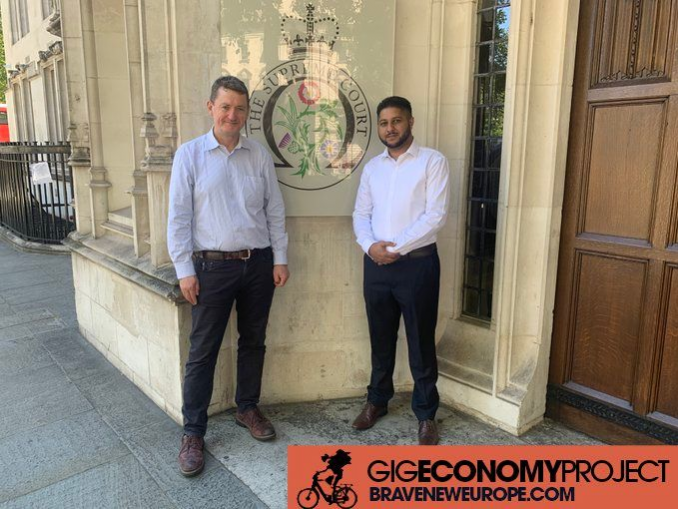Uber had sought to undermine a key part of the UK Supreme Court ruling in February, which found that the company’s drivers were workers

The Gig Economy Project, led by Ben Wray, was initiated by BRAVE NEW EUROPE enabling us to provide analysis, updates, ideas, and reports from all across Europe on the Gig Economy. If you have information or ideas to share, please contact Ben on GEP@Braveneweurope.com.
This series of articles concerning the Gig Economy in Europe is made possible thanks to the generous support of the Andrew Wainwright Reform Trust.

In a major blow to Uber in the UK, London’s High Court has found that the company’s operations in London are not compatible with the city’s transport laws.
The ruling defended the Supreme Court verdict in February which found that Uber drivers were workers for the company, and thus found a contractual arrangement exists between Uber and their passengers. Thus, Uber’s business model in London – where Uber drivers contract directly with passengers – was unlawful.
The High Court’s verdict, which is set to impact all ridehail companies in London, on Monday morning [6 December] was celebrated by James Farrar, General Secretary of the App Drivers and Couriers Union (ADCU), which made the case against Uber and the German-based platform ‘Free Now’ in the court.
“This was a failed collateral attack on the Supreme Court ruling by Uber who sought to break any link between its obligation to obey employment law and its license to operate in London,” Farrar said.
He added: “Rather than fix its broken business model, Uber was determined to double down on misclassification at the cost of worker rights, passenger safety and the avoidance of VAT. Because Transport for London [TfL] declared neutrality before the court, the ADCU had no choice but to step in and use our own meagre resources to defend this case.
“Our victory will now make misclassification unlawful, transform the London minicab industry for the better and finally eradicate sector wide worker rights abuses.”
Uber and Free Now had sought a ruling from the High Court that it’s lawful for Uber drivers to contract directly with Uber passengers because the company’s role was as an internet booking service, a position in direct contradiction with the Supreme Court ruling. If Uber had won, it could continue to hire drivers in London on an independent contractor status, meaning it would have no legal liability to customers or employment responsibilities to its workers.
However, Uber’s position was dismissed by Lord Justice Males and Mr Justice Fraser, who found “perhaps not surprisingly, that the Supreme Court meant what it said” in its ruling in February, and that therefore “in order to operate lawfully under the Private Hire Vehicles (London) Act 1998 a licensed operator who accepts a booking from a passenger is required to enter as principal into a contractual obligation with the passenger to provide the journey which is the subject of the booking.”
TfL licensed drivers have operated as direct contractors with passengers since regulations were introduced in 2002, and therefore the High Court verdict could lead to more drivers now demanding access to their workers’ rights from the US ridehail giant.
Commenting, Yaseen Aslam, ADCU President and lead claimant in the Supreme Court ruling, said: “For years, the Mayor and Transport for London told us they had no powers to protect TfL licensed drivers from brutal exploitation by licensed operators like Uber. This ruling confirms that, not only had the powers all along but, in fact, they had the duty to act on these powers but failed to do so.
“The Mayor of London must now order an urgent review of TfL to find out what went wrong, to bring the industry rapidly into compliance and to ensure passengers and drivers are never again put at risk like this.”
Uber claimed that its aim in pursuing the court case was to ensure its regulatory compliance, as TfL drivers were continuing to operate in the same way as before the Supreme Court verdict, and that it was committed to the Supreme Court ruling in February.
“This legal procedure is seeking to clarify a different and narrow point of law,” the company stated prior to the verdict.
Following the verdict, Uber stated: “This court ruling means that all the details of the Supreme Court decision are now clear.”
To sign up to the Gig Economy Project’s weekly newsletter, which provides up-to-date analysis and reports on everything that’s happening in the gig economy in Europe, leave your email here.
BRAVE NEW EUROPE has begun its Fundraising Campaign 2021
Support us and become part of a media that takes responsibility for society
BRAVE NEW EUROPE is a not-for-profit educational platform for economics, politics, and climate change that brings authors at the cutting edge of progressive thought together with activists and others with articles like this. If you would like to support our work and want to see more writing free of state or corporate media bias and free of charge. To maintain the impetus and impartiality we need fresh funds every month. Three hundred donors, giving £5 or 5 euros a month would bring us close to £1,500 monthly, which is enough to keep us ticking over.
Please donate here.


Be the first to comment